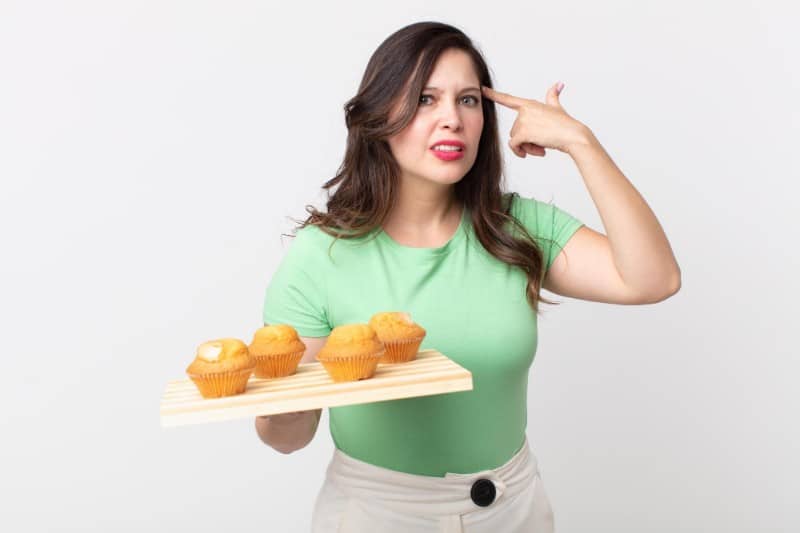I was stuck in a self-defeating cycle! I felt out-of-control with food! I was either overeating or dieting. In either mode, I felt I was never good enough. I had willpower and stick-to-itiveness in many other areas in my life. So why couldn’t I apply that same resolve to my eating habits?…
I wasted so much time, energy, and money. I was obsessed with my weight. Living like that was miserable. Today, I understand that weight was not the real problem. It was actually a symptom. The real problem was that I was an “emotional eater”.
Emotional Eaters use food to manage feelings. We use food to self-soothe. People who have struggled with it, and the professionals who treat it, call it by many different names; compulsive overeating, emotional eating, and food addiction. No matter what it’s called, people USE food because food works!
1. Food works as a tension reliever Both eating food and thinking about food work as distractions from uncomfortable feelings. Being food-focused takes the edge off any feeling that a person would rather not feel or tolerate (boredom, stress, anxiety, anger, loneliness, etc.).
For example…You’re feeling bored. Suddenly you find yourself thinking about the ice cream in the freezer. As soon as you start to think about the ice cream, you are no longer focused on feeling bored.
Food and food thoughts can be used in reaction to and as a defense against any intense feeling or stressful life situation. The use of food to manage mood becomes a self-reinforcing habit. (Today, scientists are also focused on the biology & brain chemistry of overeating. There may also be many physiological reasons why we keep turning to food even when it feels self-defeating to do so!)
2. Emotional Eating happens on a continuum Emotional eating is normal. We all celebrate with food. When something sad occurs, friends and neighbors arrive with cakes and casseroles. It’s only when emotional eating begins to have impact on one’s emotional and/or physical well-being, and it’s used as a person’s primary strategy for mood regulation, that it becomes a problem. When eating becomes a primary coping strategy, it greatly impacts a person’s quality of life. At the most extreme point on the emotional eating continuum, there may be a diagnosable eating disorder present –such as bulimia or binge eating disorder-and often, clinical depression as well.

3. Here’s how food works as a mood regulator:
- First, an emotional eater experiences an uncomfortable feeling. For example…You just had a fight with a family member and you’re feeling really angry!
- Next, you have a FOOD THOUGHT; and you find yourself reaching for a bag of chips or cookies. (You may or may not be conscious of when or why you are having a food thought.) Once you are focused on the chips, you are no longer focused on how angry you feel. The use of food as a distraction works…
- You eat the chips, warding off the anger for a little while. Then, the anger comes back. Now, in addition to the anger, an emotional overeater has to deal with the guilt and shame he/she feels every time he or she eats chips (or any other food that he or she has labeled “forbidden”).
4. This is the self-defeating cycle–the trap for an emotional eater. Until you develop healthier coping strategies, and you overcome the “good food vs. bad food” beliefs, the only way to avoid the guilt and the shame that results from emotional overeating–is more emotional overeating! Every time we swear we’ll be “good” on a diet today, and then turn back to food for comfort, we feel like we have “failed”. Then, to “stuff down” our frustration, or anger, or desperation, we turn back to food.
5. So, what can you do if Emotional Eating is a problem? Make a conscious effort to become more aware of how and why you may be using food. Develop new skills for mood regulation. If you need support to do so, find appropriate professional help (find a class, hire a Coach or a Licensed Psychotherapist). The focus should be on self-care and improved emotional and physical well-being–eating well and being fit–not on dieting and weight loss. Remember, dieting is a trap for an emotional eater. Dieting just leads to more emotional eating.
About the Author:
Ellen Shuman, Hyde Park-Cincinnati, OH
info@aweighout.com
http://www.aweighout.com
Ellen Shuman is the founder and Exec. Director of the WellCentered Eating Disorder Treatment Programs & www.aweighout.com, which conducts Phone Coaching & Groups about Emotional Eating to people worldwide. A Peabody/Emmy Award winning journalist, Shuman entered the wellness field in 1992 following an appearance on the Oprah Winfrey Show. Today, she speaks nationally on the subjects of emotional eating, body image & size-ism.








